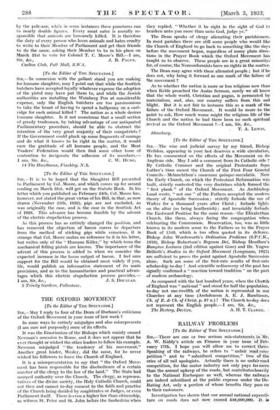THE OXFORD MOVEMENT
[To the Editor of THE SPECTATOR.]
SIR,—May I reply to four of the Dean of Durham's criticisms of the Oxford Movement in your issue of last week ?
In some ways he entirely misjudges and also misrepresents (I am sure not purposely) some of its effects.
It was the Erastianism of the Bishops which mainly caused Newman's secession to Rome, and it does not appear that he ever thought or wished the other leaders to follow his example. Newman misjudged " the tendency of his movement." Another great leader, Wesley, did the same, for he never wished his followers to leave the Church of England.
It is a misrepresentation to say that " the Oxford Move- ment has been responsible for the disobedience of a certain number of the clergy to the law of the land." The State had usurped authority over the Church. The clergy, as represen- tatives of the divine society, the Holy Catholic Church, could not then and cannot to-day consent to the faith and practice of the Church being decided by magistrates or Judges, or even Parliament itself. There is even a higher law than citizenship, as witness St. Peter and St. John before the Sanhedrin when they replied, " Whether it be right in the sight of Cod ti hearken unto you more than unto God, judge ye."
The Dean speaks of clergy alienating their parishioners. In most parishes there are still some people who would like the Church of England to go back to something like the days before the movement began, regardless of many plain direc- tions in the Prayer Book which the Oxford Movement his taught us to observe. These people are in a great minority,1 for, of course, the Nonconformists have no rights in the matter.
The Dean may agree with these alienated people ; but if he does not, why bring it forward as one mark of the failure of the movement ?
As to whether the nation is more or less religious now than when Iieble preached the Assize Sermon, surely we all know that the whole world, Christian and pagan, is permeated by materialism, and, alas, our country suffers from this sad blight. But it is not fair to instance this as a mark of the failure of the Oxford Movement. It would be more to the point to ask, HOW much worse might the religious life of the Church and the nation be had there been no such spiritual revival as the Oxford Movement 7—I am, Sir, &c.,


















































 Previous page
Previous page